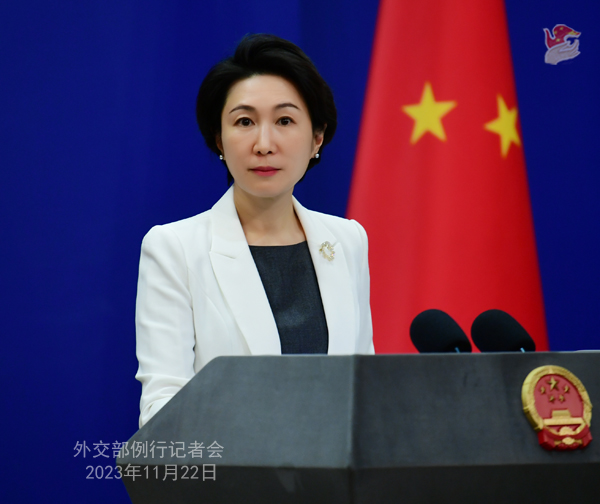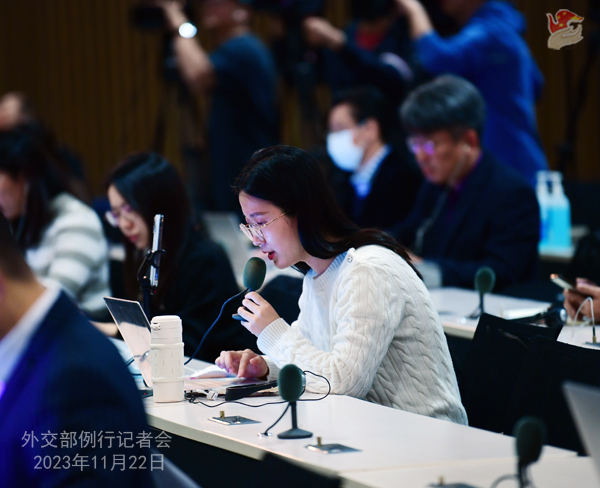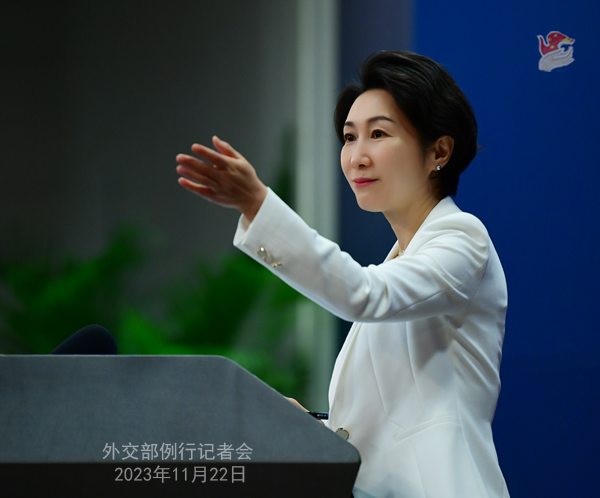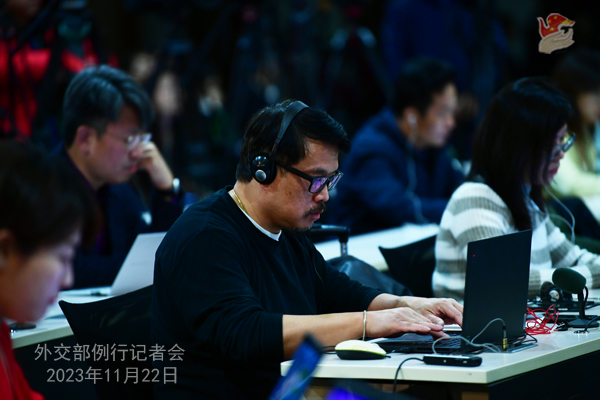| Foreign Ministry Spokesperson Mao Ning’s Regular Press Conference on November 22, 2023 |
| 2023-11-22 19:00 |
|
At the invitation of Member of the Political Bureau of the CPC Central Committee and Minister of Foreign Affairs Wang Yi, French Minister for Europe and Foreign Affairs Catherine Colonna will visit China from November 23 to 24 and hold the 6th meeting of the China-France high-level dialogue mechanism on people-to-people exchanges. China News Service: The DPRK announced in the early morning today that it had successfully launched a reconnaissance satellite last night. Countries including the US, Japan and the ROK said the launch involved the use of ballistic missile technology and is a violation of relevant UN Security Council resolutions. They said they would respond with strong measures. What’s your comment? Mao Ning: We’ve noticed the DPRK’s announcement of the satellite launch and the response of relevant parties. The Korean Peninsula is in today’s situation for a reason. A peaceful and stable Peninsula and a political settlement serves the interests of all countries in the region. We hope all parties will exercise calm and restraint, stick to the direction of seeking political settlement, follow the dual-track approach and the principle of phased and synchronized steps, engage in meaningful dialogue and address each other’s legitimate concerns in a balanced way. China will continue to play a constructive role in promoting a political settlement. AFP: Hamas announced that it has reached a deal that includes a four-day pause in fighting with Israel. What’s China’s response? Mao Ning: Since this round of Palestinian-Israeli conflict broke out, China has been calling for a ceasefire and working to deescalate the situation, protect civilians and provide humanitarian assistance. We welcome the agreement and hope this will help ease the humanitarian crisis, deescalate the conflict and cool down the tensions. CCTV: President Xi Jinping attended the BRICS extraordinary virtual summit on the Palestinian-Israeli issue last night upon invitation and delivered an important speech. Can you brief us on the meeting and its outcomes? Mao Ning: BRICS is an important platform for enhancing solidarity and cooperation and upholding common interests among emerging markets and developing countries. This meeting is the first summit since BRICS decided to expand and an important meeting at a critical time as the Palestinian-Israeli conflict continues to escalate. President Xi Jinping delivered an important speech at the summit and outlined China’s position and proposal on the Palestinian-Israeli issue. He pointed out that it’s urgent and imperative to end hostilities and achieve a ceasefire immediately, keep humanitarian corridors secure and unimpeded and prevent the conflict from spilling over. President Xi pointed out from his deep observation that the only viable way to break the cycle of Palestinian-Israeli conflict lies in the two-state solution. There can be no sustainable peace and stability in the Middle East without a just solution to the question of Palestine. China calls for early convening of an international peace conference that is more authoritative to build international consensus for peace and work toward an early solution to the question of Palestine that is comprehensive, just and sustainable. President Xi Jinping also spoke about what China has done to promote peace talks and help ease the humanitarian plight in Gaza since the outbreak of the latest Palestinian-Israeli conflict. President Xi Jinping’s speech addresses both immediate and long-term priorities and identifies the direction of effectively solving the Palestinian-Israeli issue. His speech resonated with other summit participants, who thanked China for galvanizing the adoption of UN Security Council Resolution 2712 as this month’s Council president. They stressed that the international community needs to earnestly implement relevant resolutions, realize durable and sustained humanitarian truce and ensure full, immediate, unimpeded and sustainable humanitarian access, address differences and disputes through dialogue and inclusive consultation, and prevent violence in the Middle East from escalating and the conflict from spilling over. As President Xi Jinping said, given the current circumstances, it is very timely and very important that BRICS countries meet and speak up for justice and for peace on the Palestinian-Israeli issue and the meeting marks a good start for greater BRICS cooperation following its enlargement. China hopes to continue to work with other BRICS countries to bring about a ceasefire and realize lasting peace in the Middle East.
Xinhua News Agency: Any detailed information about the French Foreign Minister’s visit to China and the 6th meeting of the China-France high-level dialogue mechanism on people-to-people exchanges? How does China view its relations with France at the moment? What does China hope to achieve through this visit? Mao Ning: During Foreign Minister Colonna’s visit to China, Premier Li Qiang will meet with her; she and Member of the Political Bureau of the CPC Central Committee and Minister of Foreign Affairs Wang Yi will hold the 6th meeting of the China-France high-level dialogue mechanism on people-to-people exchanges and attend the side events. The two foreign ministers will also hold talks and jointly meet the press. China and France are both permanent members of the UN Security Council and independent major countries. At present, under the joint leadership of the two heads of state, bilateral relations have enjoyed sound growth. The two sides have had frequent high-level exchanges, made steady progress in exchanges and cooperation in various fields and maintained sound multilateral communication and coordination. Our two countries have also worked together to respond to global challenges. Next year marks the 60th anniversary of the establishment of diplomatic ties between China and France. It is also the China-France Year of Culture and Tourism. The two sides are planning a series of relevant activities. This will be Foreign Minister Colonna’s first visit to China since she took up the post. An important item on the agenda is the 6th meeting of the China-France high-level dialogue mechanism on people-to-people exchanges that she will hold with Foreign Minister Wang Yi. This will be the first time for China to hold a meeting of dialogue mechanism on people-to-people exchanges with an European country in recent years. China looks forward to working with France to deepen exchanges on bilateral relations especially cooperation in education, culture, technology, health care, sports and other areas between the two countries, promote cultural mutual learning and people-to-people friendship and add new impetus to China-France relations. KBS: The ROK government announced that it would partially suspend the Pyongyang Joint Declaration of September 2018 which restricts the ROK’s reconnaissance in response to the DPRK’s launch of the reconnaissance satellite and its build-up of reconnaissance and surveillance capability. It may lead to growing military tensions on the Peninsula. What’s the position of the Chinese government on that? Mao Ning: We’ve noticed relevant reports. The current situation on the Korean Peninsula is complex and sensitive. All parties need to exercise calm and restraint, face up to the crux of the issues, strive for a political settlement and do more to ease tension, resume dialogue and improve relations. Bloomberg: The US and the Philippines are resuming their patrols in the South China Sea, first time in several years. Can you tell us China’s reaction? Mao Ning: China has stated its position to the Philippines and the US. The joint patrol must not hurt China’s territorial sovereignty and maritime rights and interests.
Reuters: About the North Korean satellite launch, has China contacted North Korea about the launch and does the development concern China? Mao Ning: I shared our position on the DPRK’s launch of the satellite just now. On your specific question, I have nothing to offer. Reuters: Fiji Prime Minister Rabuka said he anticipates potential collaboration with China on a key port modernization and shipyard project, which he said he had discussed with President Xi in San Francisco last week. Could the ministry share more details about talks on this collaboration? What has China offered with regard to this? Mao Ning: Regarding the meeting between President Xi and Prime Minister Rabuka, the Chinese side has put out a press release and you may refer to that. China and Fiji are good friends and good partners. The two countries have carried out practical cooperation in infrastructure and other fields, which boosts economic and social development in Fiji. China’s cooperation with Pacific Island countries including Fiji is always based on mutual respect, equality, mutual benefit, openness and transparency. The goal is to support island countries in making life better for their people and achieving development and prosperity. Reuters: Earlier reports have said that China, South Korea and Japan were aiming for a trilateral foreign ministerial meeting this month, possibly on November 26, which is this Sunday. Is the meeting still happening this weekend? And if so, what issues will China bring up at the discussion? Mao Ning: The trilateral cooperation serves the common interests of our three countries. China values the mechanism and looks forward to working with the ROK and Japan to deepen that cooperation.
|
 | ||||||||||||
 | ||||||||||||
|



